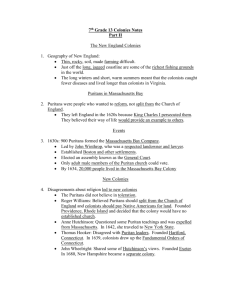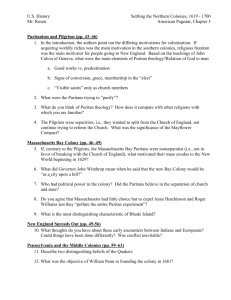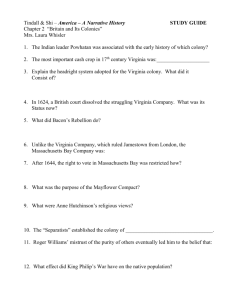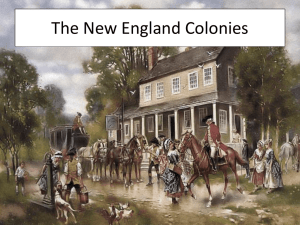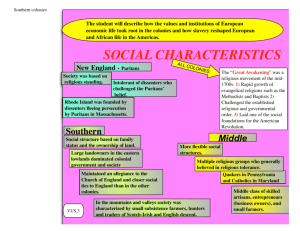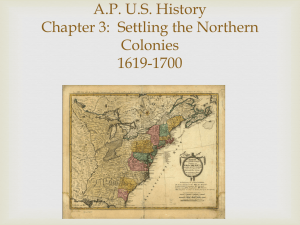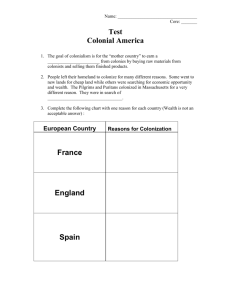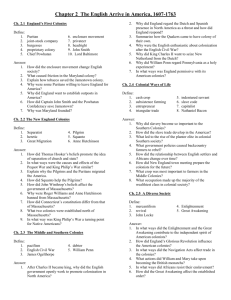Chapter 3 Test Review Key
advertisement
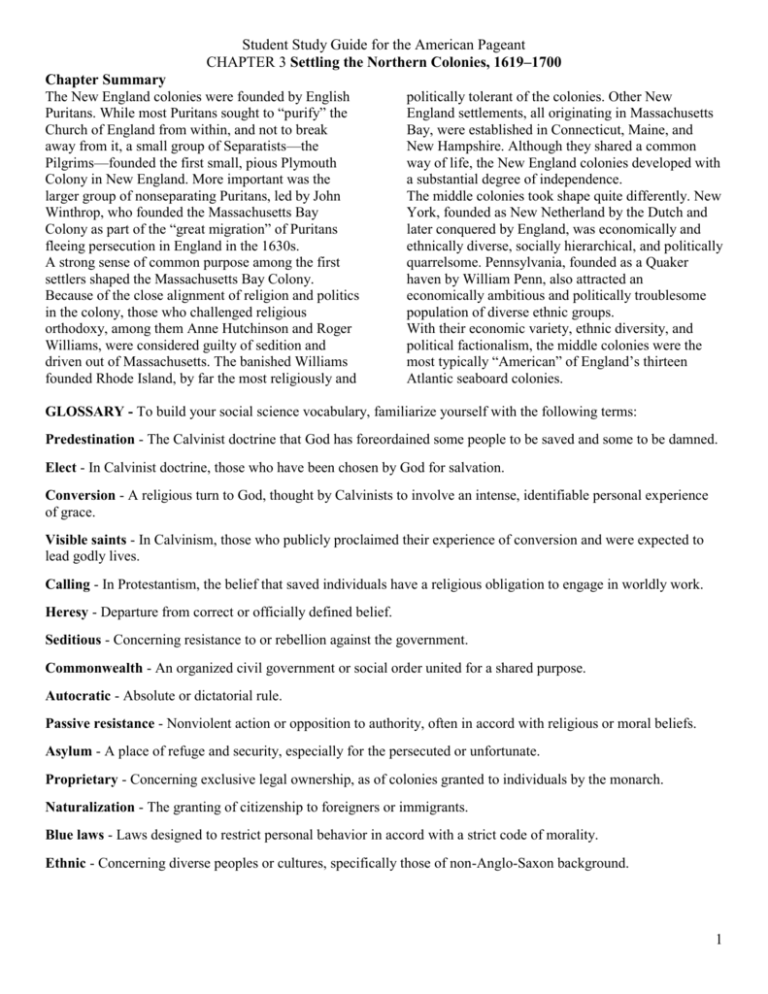
Student Study Guide for the American Pageant CHAPTER 3 Settling the Northern Colonies, 1619–1700 Chapter Summary The New England colonies were founded by English Puritans. While most Puritans sought to “purify” the Church of England from within, and not to break away from it, a small group of Separatists—the Pilgrims—founded the first small, pious Plymouth Colony in New England. More important was the larger group of nonseparating Puritans, led by John Winthrop, who founded the Massachusetts Bay Colony as part of the “great migration” of Puritans fleeing persecution in England in the 1630s. A strong sense of common purpose among the first settlers shaped the Massachusetts Bay Colony. Because of the close alignment of religion and politics in the colony, those who challenged religious orthodoxy, among them Anne Hutchinson and Roger Williams, were considered guilty of sedition and driven out of Massachusetts. The banished Williams founded Rhode Island, by far the most religiously and politically tolerant of the colonies. Other New England settlements, all originating in Massachusetts Bay, were established in Connecticut, Maine, and New Hampshire. Although they shared a common way of life, the New England colonies developed with a substantial degree of independence. The middle colonies took shape quite differently. New York, founded as New Netherland by the Dutch and later conquered by England, was economically and ethnically diverse, socially hierarchical, and politically quarrelsome. Pennsylvania, founded as a Quaker haven by William Penn, also attracted an economically ambitious and politically troublesome population of diverse ethnic groups. With their economic variety, ethnic diversity, and political factionalism, the middle colonies were the most typically “American” of England’s thirteen Atlantic seaboard colonies. GLOSSARY - To build your social science vocabulary, familiarize yourself with the following terms: Predestination - The Calvinist doctrine that God has foreordained some people to be saved and some to be damned. Elect - In Calvinist doctrine, those who have been chosen by God for salvation. Conversion - A religious turn to God, thought by Calvinists to involve an intense, identifiable personal experience of grace. Visible saints - In Calvinism, those who publicly proclaimed their experience of conversion and were expected to lead godly lives. Calling - In Protestantism, the belief that saved individuals have a religious obligation to engage in worldly work. Heresy - Departure from correct or officially defined belief. Seditious - Concerning resistance to or rebellion against the government. Commonwealth - An organized civil government or social order united for a shared purpose. Autocratic - Absolute or dictatorial rule. Passive resistance - Nonviolent action or opposition to authority, often in accord with religious or moral beliefs. Asylum - A place of refuge and security, especially for the persecuted or unfortunate. Proprietary - Concerning exclusive legal ownership, as of colonies granted to individuals by the monarch. Naturalization - The granting of citizenship to foreigners or immigrants. Blue laws - Laws designed to restrict personal behavior in accord with a strict code of morality. Ethnic - Concerning diverse peoples or cultures, specifically those of non-Anglo-Saxon background. 1 Locate the following places by reference number on the map: ____ Rhode Island ____ Massachusetts Bay ____ New Hampshire ____ Pennsylvania ____ New Jersey ____ Delaware ____ New York ____ Plymouth Locate the following places by reference number on the map: ____ Boston ____ Salem ____ Connecticut River ____ Delaware Bay ____ Hudson River ____ New York City ____ Albany ____ Philadelphia 2 Why is John Calvin a significant figure in U.S. History? ____________________________________________________ _________________________________________________________________________________________________ ________________________________________________________________________________________________ _________________________________________________________________. What action taken by Henry VIII aided the entrance of Protestant beliefs into England? (pg. 44) ____________________ _________________________________________________________________________________________________. What impact did the Mayflower Compact have on self-government in the United States? (pg. 44) __________________ _________________________________________________________________________________________________. What special qualities did William Bradford possess? (pg. 45) _____________________________________________ _________________________________________________________________. What was the historical significance of the Pilgrims of Plymouth Bay? (pg. 45) _______________________________ _________________________________________________________________. What was the primary difference between the Separatists and the Puritans (pg. 45) ______________________________ ___________________________________________________________________________________________. Explain the ways in which the Massachusetts Bay Colony was “blessed”? (pg. 46-47) ___________________________ _________________________________________________________________________________________________ _____________________________________________________. What did Governor Winthrop mean when he said “we shall be a city upon a hill”? (pg. 46) ________________________ _________________________________________________________________________________________________ Test Practice Among the Puritans, it was understood that (pg. 47) A) they would establish democratic government in America. B) clergymen would hold the most powerful political office. C) the purpose of government was to enforce God's laws. D) all adult white male landowners could vote for political leaders. E) women could become religious leaders. What happened to people who flouted (disobey) the authority of the Puritan clergy in Massachusetts Bay? (pg. 47) _______________________________________________________________________________________________ ___________________________________________________________________________________________. What belief did Anne Hutchinson advocate that violated Puritan doctrine? (pg. 47) ______________________________ _________________________________________________________________________________________________ ________________________________________________________________________. 3 Test Practice Roger Williams' beliefs included all of the following except (pg. 48) A) breaking away from the Church of England. B) demanding oaths regarding religious beliefs. C) condemning the taking of Indian land without fair compensation. D) denying the authority of the civil government to regulate religious matters. E) challenging the legality of Massachusetts Bay's charter. Settlers of the Connecticut River colony were formed by: (pg. 49) ___________________________________________ ______________________________________________________________________________________________. Study the map and its caption on page 49 Test Practice: Unlike other English voyagers to the New World, the Puritans (pg. 51) A) transplanted entire communities. B) lost most of their Old World habits. C) immigrated as individuals rather than in groups. D) came only for religious reasons. E) renounced their membership in the Church of England. During the early years of colonization in the New World, England (pg. 53) A) closely controlled its colonies. B) maintained an excellent relationship with the Indians. C) paid little attention to its colonies. D) made sure all the colonies had royal charters. E) began the importation of African slaves in large numbers. In what way did the New England Confederation have a long-lasting significance? ______________________________ _________________________________________________________________________________________________ ___________________________________________. What is benign neglect and why did it become prolonged? _________________________________________________ ________________________________________________________________________________________________. What was the purpose of the Dominion of New England? (pg. 53-54) _________________________________________ __________________________________________________________________________________________________ _________________________________________________________________________________________________. What effect did the Dominion of New England have on the American colonists? (pg. 54) __________________________ _______________________________________________________________________. What impact did England's Glorious Revolution have on the colonies? (pg. 54) _________________________________ _________________________________________________________________________________________________. Explain the origins of the Dutch colony of New York? (pg. 56) _____________________________________________ _________________________________________________________________________________________________ _________________________________________________________________________________________________. Test Practice The New England Confederation regarded Dutch New Netherland as (pg. 56) A) a welcome friend. B) an enemy to be wiped out. C) an easy target for Indian raids. D) the next victim of New Sweden. E) a trading partner. When the English gained control over New Netherland, (pg. 58) A) the autocratic spirit survived. B) democracy replaced the old autocratic system. C) the colony grew quickly. D) new leaders distributed land grants in a more democratic fashion. E) they did so with great bloodshed. 4 Summarize some of the characteristics of the Quakers? (pg. 59) _____________________________________________ _________________________________________________________________________________________________ _________________________________________________________________________________________________. These next two questions have the answers summarized for you in blue underlined font – read them carefully Describe the founding of Pennsylvania: (pg. 60) In 1861, from a debt owed his deceased and unapproving father, young Willam Penn secured a large tract of land in the New World to serve as a refuge for other Quakers, persecuted in England. He advertised aggresively for additional settlers to come and grow the colony. They were very tolerant of the Indians and had good relations with them for a while, until the Scots-Irish arrived. Due to its many liberal features (modern, economic opportunity, civil liberty, religious freedom) Pennsylvania “held aloft a hopeful torch in a world of semi-darkness”, and thus attracted a wide range of ethnic groups. By 1700, only Virginia and Mass had > populations. Explain the general features of the Middle colonies: (pg. 62) broad expanse of land, fertile soil, broad unhurried streams, lumbering, shipbuilding and commerce, more ethnically mixed than the other colonies, religion tolerant. Economic and social democracy prevailed. Quakers – proportionately, made a compassionate contribution to human freedom. Test Practice: The middle colonies were notable for their (pg. 61) A) lack of good river transportation. B) unusual degree of democratic control. C) lack of industry. D) status as the least “American” of the colonies. E) established churches. Arrange the following events in chronological order: (A) great Puritan migration, (B) founding of Plymouth Colony, (C) Protestant Reformation, (D) founding of Rhode Island. Arrange the following in chronological order: the founding of (A) New York, (B) Massachusetts Bay, (C) Pennsylvania, (D) Plymouth. Carefully read the “Varying Viewpoints” on page 64-65 to answer these last two questions: These special sections deal with an area of historical studies known as historiography. It is a requirement of this course that you read these sections and other handouts on historiography – which, defined simply, address the art of historical interpretation. More specifically, historians are constantly reviewing new materials and studies to form an ever changing view of how certain historical events are to be explained and understood. Recently, historians have increasingly viewed the colonial period as? (pg. 64) _________________________________ ________________________________________________________________________________________________ ______________________________________________________________________________________________. The picture of colonial America that is emerging from new scholarship is a society formed by: (pg. 64-65) __________ ________________________________________________________________________________________________ _______________________________________________________________________________________________. Chapter Review Questions Multiple Multiple Choice Test Practice: Each of the following questions may have two, three, four, or five correct answers. Mark all correct answers for each question. John Calvin believed in a. predestination. b. conversion. c. the “elect.” d. antinomianism. e. divinity of Mary. 5 Puritans a. were Calvinists. b. thought that the Church of England should be open to all comers. c. especially attracted England's economically depressed. d. thought that the Protestant Reformation was bringing too much change too quickly. e. supported the Separatists. Separatists a. were radical Puritans. b. were also known as Pilgrims. c. authored the Mayflower Compact. d. sought to reform the Church of England from within. e. were led by John Winthrop. The New England colonies included a. Massachusetts Bay. b. New York. c. Connecticut. d. Rhode Island. e. Pennsylvania. Roger Williams got into trouble with Massachusetts Bay authorities because he a. questioned the legality of the Massachusetts Bay charter. b. advocated Roman Catholicism. c. claimed that the colony's civil government should not regulate religious behavior. d. claimed to have had a direct revelation from God. e. wanted to leave the colony. Factors leading to the first major European migration include a. a population explosion. b. economic depression. c. better quality ocean going vessels. d. religious repression. e. the use of African slaves. The Pequot War of 1637 resulted in a. the abolition of Indian “praying towns.” b. the virtual annihilation of the Pequots. c. four decades of uneasy peace between the Puritans and the Indians. d. praise for the colonists from people in England for having dealt effectively with the Indians. e. better relations with the remaining Indians. Pennsylvania a. introduced an unusually liberal land policy that attracted a heavy flow of immigrants. b. had fertile soil that produced surplus grain for export. c. was first settled by small colonies of Swedes. d. was founded with the intention of making a profit. e. was named after William Penn. 6
